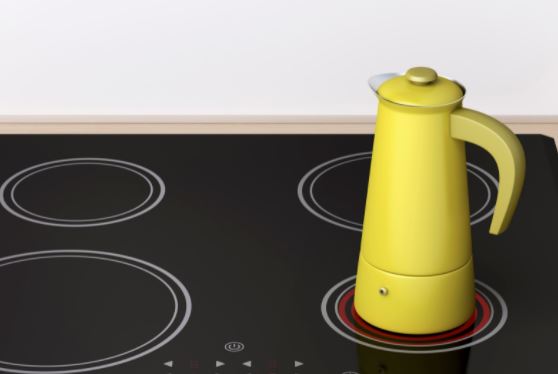Induction Cooktop vs Electric Cooktop: Having a quality cooktop is quite essential to prepare a wide variety of dishes. In the primitive age, people used open fires in jungles and mountains to cook food. With time, evolution occurred in the cooking appliance industry, and gas and electricity came for ease of cooking.
Highlights on Induction Cooktop vs Electric
- Induction directly heats cookware; electric heats pans and retains heat.
- Induction Cooktop is Cool to touch, easy to clean, efficient, quick, but costlier and requires specific cookware.
- Electric Cooktop is Easy to use, retains heat, budget-friendly, versatile, but remains hot and is slower.
- Induction is faster and safer but needs special cookware; Electric is budget-friendly but slower with residual heat, while Induction is efficient but pricier.
In the modern period, people around the universe used induction and electric cooktops. These cooktops sound similar, and you may not be able to differentiate them easily. When you need to choose either option, you may get confused to see the similarities between the two.
Which is Better, Electric or Induction Cooktop?

In general, both cooktops are the same in using electric currents as the primary power source. Despite that, you’ll identify several differences between induction cooktops and electric cooktops that can help you narrow down the right choice.
What is the Main Difference Between Electric and Induction Cooktops?
Here, we’re going to show you some essential factors in which electric and induction cooktops differ. We’ll also let you know what induction and electric cooktops are with some pros and cons. Do you already know about them? If yes, skip to the following section.
What is an Induction Cooktop?

An induction cooktop is a heating device that works on electricity and magnetism, called electromagnetism. It uses alternating current to make it a constantly changing magnetic field that heats the cookware itself, not the entire heating element. You can see our previous entry about How Induction Cooktop Works for more clear perception.
Besides, induction cooktops don’t make the kitchen atmosphere as hot as other types of cooktops. Consequently, you can cook many dishes on induction cooktops without much sweating. On an induction cooktop, you’re allowed to use only iron-alloy cooking utensils.
Pros
- Remains cool to touch
- Ensure easy cleanup
- Needs lower energy costs
- Keeps the kitchen cooler
- Reduces your cooking time
Cons
- More expensive than electric cooktops
- Particular pans and pots are required
What is an Electric Cooktop?

An electric cooktop is a useful kitchen appliance that works on direct electricity through a metal coil. This electrical heating device heats the entire cooking surface, not only the cookware itself. Typically, it has a flat surface made of glass ceramic on top of the electric burners.
On an electric cooktop, you can place any cookware to cook your favorite foods. Besides, the cooktop needs less labor and time compared to gas cooktops. Since the cooking surface is smooth, you can easily clean the cooktop with a clean cloth when it becomes cold.
Pros
- Easy to install and use.
- Offers residual heat.
- Less expensive than induction cooktops.
- Needs lower energy costs.
- Suitable for any cookware.
Cons
- Remains hot to the touch after turning it off.
- It May take too long to heat up.
Induction Cooktop vs Electric Cooktop – What are the Key Differences?
If you’re looking for either induction or electric cooktop, you have to compare them to some factors. Here we’re going to talk about some essential aspects that help you decide which one you should purchase according to your requirements.
1. Heat Generation
You may know that both induction and electric cooktops use electricity as the power source. However, electric cooktops transfer heat to the pan for cooking through an iron coil, which gets the heat radiated by nichrome elements.
Induction cooktops, in contrast, work on electric and magnetism, called electromagnetism. They use alternating currents to heat the magnetic field. When you place a piece of iron cookware on your induction cooktop, it heats the cookware, not the entire cooking surface.
2. Energy Efficiency
When it comes to measuring energy efficiency, electric cooktops use around 70% of the consumed electricity for cooking food. Induction cooktops, however, use 90% of the electricity consumed in cooking food. So, induction cooktops are more efficient than electric cooktops.
3. Type of Cookware
If you want to cook a meal on an induction cooktop, you must need ferrous metal cookware, like stainless steel or cast iron. Induction cooktops cannot transfer heat to ceramic, glass, aluminum, and copper cookware, thanks to the failure to produce a concentrated current.
On the other hand, electric cooktops don’t require any unique cookware, which means you can use any cookware on electric cooktop surfaces. So, electric cooktops are a better option than induction ones in the case of using cookware.
4. Temperature
The maximum temperature of induction cooktops can reach up to 700 degrees Fahrenheit, while 750 degrees Fahrenheit is the highest temperature of electric cooktops. Besides, electric cooktops remain hot for some time after you’ve turned them off.
5. Cooking Speed
As a general rule, electric cooktops take much time to heat up, but induction cooktops heat quickly immediately after you’ve put the cookware on them. Therefore, induction cooktops have a faster cooking speed than electric ones.
We have done a test of boiling the same amount of water on both induction and electric cooktops. The electric cooktop boiled the water in 5 minutes and 50 seconds, whereas the induction cooktop took 3 minutes to boil the water, almost twice as fast as the electric one.
Read More – Induction Cooktop VS Glass Top
6. Power Consumption
Both induction and electric cooktops don’t need outlets beyond 220 to 240 volts. When it comes to power consumption, electric cooktops consume 320 watt-hours to boil 2 liters of water, while induction cooktops require 225 watt-hours to do the same job.
7. Safety
Electric cooktops are not as safe as induction cooktops because the heating element of the electric cooktops can produce radiant heat to the cookware. This means electric cooktops can still be hot for a while after turning them off, which may burn you.
8. Maintenance
In terms of maintenance, electric cooktops are less complicated. They have heating coils that are easy to repair or replace with simple tools. On the other hand, induction cooktops come with electromagnetism technology, and that’s why they need special tools to fix.
9. Cleaning
Thanks to the glass-ceramic surface, induction cooktops are easy to clean with a piece of clean, dry cloth. Electric cooktops, on the contrary, also have a glass-ceramic surface and are easy to clean, but you have to wait until they’re completely cool.
If you clean the surface of electric cooktops immediately after they’re turned off, the glass-ceramic surface can crack. However, you can clean induction cooktops right after turning them off because they don’t have any radiant heat.
10. Price
Induction cooktops are more expensive than electric ones, which doesn’t mean that you cannot purchase a top-quality electric cooktop. Also, this entirely depends on the particular model, its brand, and the features it comes with.

Conclusion
After all, choosing a cooktop, either induction or electric, entirely depends on your preference and requirements. If you don’t want to change, you can stick with an electric cooktop. Nothing can influence you to select an induction cooktop for your kitchen.
However, if you’re after a cooktop that delivers faster cooking with even heating, then you should opt for an induction cooktop. We would also recommend you purchase an induction cooktop due to its reducing energy costs and increased safety.
Read More – How to Remove Scratches From Glass Cooktop

Hello! I’m Paula Deen, a mother who loves to create memories in the kitchen. As a kitchen enthusiast, I love to do experiment with different kitchenware for daily recipes. This is my blog, where I’ll share my experience, knowledge, and reviews on various kitchenware and appliances.